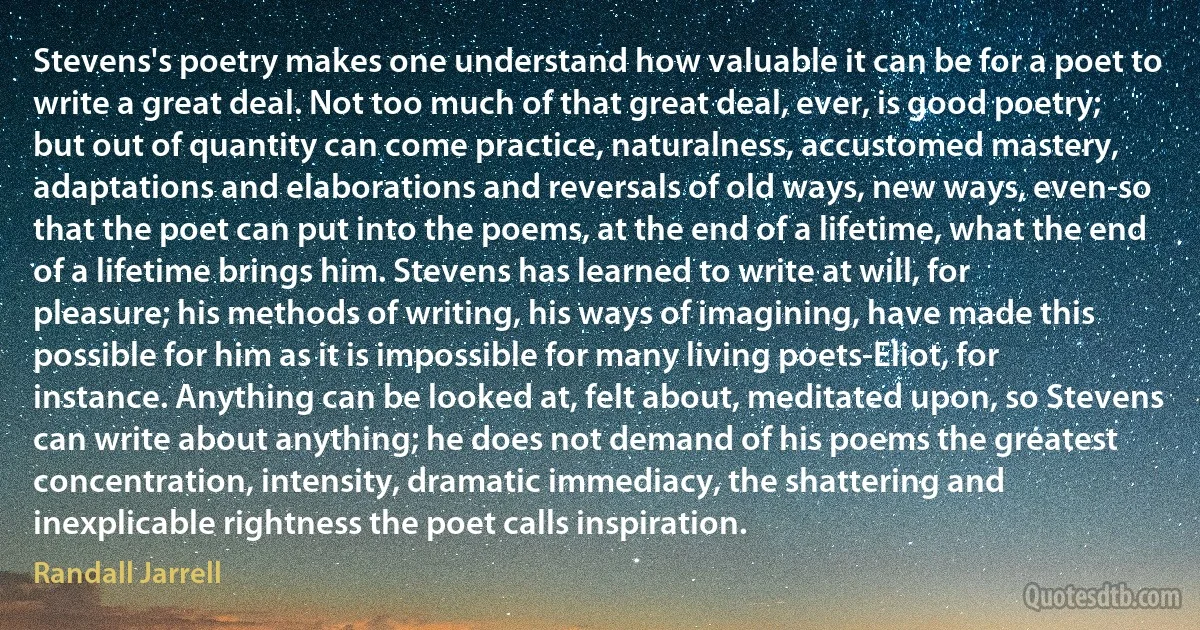
Stevens's poetry makes one understand how valuable it can be for a poet to write a great deal. Not too much of that great deal, ever, is good poetry; but out of quantity can come practice, naturalness, accustomed mastery, adaptations and elaborations and reversals of old ways, new ways, even-so that the poet can put into the poems, at the end of a lifetime, what the end of a lifetime brings him. Stevens has learned to write at will, for pleasure; his methods of writing, his ways of imagining, have made this possible for him as it is impossible for many living poets-Eliot, for instance. Anything can be looked at, felt about, meditated upon, so Stevens can write about anything; he does not demand of his poems the greatest concentration, intensity, dramatic immediacy, the shattering and inexplicable rightness the poet calls inspiration.
Randall JarrellRelated topics
anything concentration deal end felt good great imagining immediacy impossible instance intensity lifetime living naturalness pleasure possible practice rightness valuable write waysRelated quotes
There are particular movements in particular epochs in which the Divine Force manifests itself with supreme power shattering all human calculations, making a mock of the prudence of the careful statesman and the scheming politician, falsifying the prognostications of the scientific analyser and advancing with a vehemence and velocity which is obviously the manifestation of a higher than human force. The intellectual man afterwards tries to trace the reasons for the movement and lay bare the forces that made it possible, but at the time he is utterly at fault, his wisdom is falsified at every step and his science serves him not. These are the times when we say God is in the movement, He is its leader and it must fulfil itself however impossible it may be for man to see the means by which it will succeed.

Sri Aurobindo
The undulation of these infinite numbers of mountains, whose snowy summits make them look as if covered by foam, recalled to my remembrance the surface of a storm-beaten ocean. If I looked towards the west, the ocean lay before me in all its majestic grandeur, a continuation as it were, of these fleecy hilltops. Where the earth ended and the sea began it was impossible for the eye to distinguish.I soon felt that strange and mysterious sensation which is awakened in the mind when looking down from lofty hilltops, and now I was able to do so without any feeling of nervousness, having fortunately hardened myself to that kind of sublime contemplation. I wholly forgot who I was, and where I was. I became intoxicated with a sense of lofty sublimity, without thought of the abysses into which my daring was soon about to plunge me.

Jules Verne
It is impossible for any man, when the most favourable circumstances concur, to acquire sufficient knowledge and strength of mind to discharge the duties of a king, entrusted with uncontrolled power; how then must they be violated when his very elevation is an insuperable bar to the attainment of either wisdom or virtue; when all the feelings of a man are stifled by flattery, and reflection shut out by pleasure! Surely it is madness to make the fate of thousands depend on the caprice of a weak fellow creature, whose very station sinks him NECESSARILY below the meanest of his subjects! But one power should not be thrown down to exalt another--for all power intoxicates weak man; and its abuse proves, that the more equality there is established among men, the more virtue and happiness will reign in society.

Mary Wollstonecraft
My wife has just finished reading aloud your 'Life with a Black Regiment,' and you must allow me to thank you heartily for the very great pleasure which it has in many ways given us. I always thought well of the negroes, from the little which I have seen of them; and I have been delighted to have my vague impressions confirmed, and their character and mental powers so ably discussed. When you were here I did not know of the noble position which you had filled. I had formerly read about the black regiments, but failed to connect your name with your admirable undertaking. Although we enjoyed greatly your visit to Down, my wife and myself have over and over again regretted that we did not know about the black regiment, as we should have greatly liked to have heard a little about the South from your own lips.

Charles Darwin
Just as the various trades are most highly developed in large cities, in the same way food at the palace is prepared in a far superior manner. In small towns the same man makes couches, doors, plows and tables, and often he even builds houses, and still he is thankful if only he can find enough work to support himself. And it is impossible for a man of many trades to do all of them well. In large cities, however, because many make demands on each trade, one alone is enough to support a man, and often less than one: for instance one man makes shoes for men, another for women, there are places even where one man earns a living just by mending shoes, another by cutting them out, another just by sewing the uppers together, while there is another who performs none of these operations but assembles the parts, Of necessity, he who pursues a very specialised task will do it best.

Xenophon
